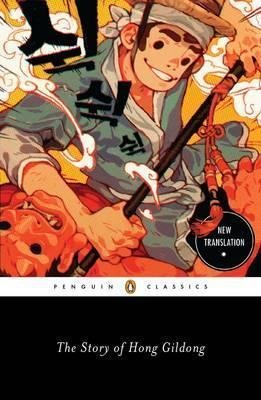The Story of Hong Gildong, translated by Minsoo Kang. Penguin Classics: New York, 2016. (Print/ebook editions)
If you only check out one book from “Appendix K” as inspiration for your Korean-flavored fantasy RPG set in the Koryo Hall of Adventures setting, it should be The Story of Hong Gildong. As the masterful translator Minsoo Kang explains, this novel has had a profound effect on Korean culture and its sensibilities regarding heroism. (In fact, the book is so celebrated that when a fake name is needed for a government form or fake credit card, people usually just use his name.) The introduction is quite thorough in assessing the (often questionable) scholarship surrounding the text, but also looks at the text in terms of the class system and politics of the Joseon Dynasty, the most recent, and last, dynasty to rule over Korea.
Still, as the translator also notes, The Tale of Hong Gildong isn’t primarily a political screed: it’s intended first and foremost to be an entertaining narrative, and it definitely succeeds. For RPG enthusiasts, Hong Gildong’s career reads like an account of the kind of solo campaign you’d kill to play in: Hong is born the son of a concubine, noble of blood but doomed by an accident of birth to suffer the squandering of his noble aspirations. His hopes foiled, he becomes an adventurer, as one does.
Although there’s a common tendency to summarize what follows as Hong being “the Korean Robin Hood,” this doesn’t really do the strangeness and scope of Hong’s odyssey justice. At various points in the tale, he passes through a series of occupations, each more surprising than the last: this once precocious child becomes a fledgling autodidact sorcerer; a mysterious wanderer; a infamous captain of a bandit gang; an exile from his homeland; a military conquerer; and finally, the ruler of his own kingdom on a distant, mysterious island.
Hong is a pretty good model for a fun RPG character: he’s a consummate trickster armed with cunning and magic, but also has a heart. He might be willing to throw away a lot for glory, justice, and power, but he also is moved by a purpose and by the injustices he himself faced. He can also inspire players to think outside the box when plotting out a character’s career trajectory, too: making a rogue, thief, or even a ranger character become the captain of a gang of hill-bandits is a no-brainer, but doing so with a wizard character is surprising, weird, and brilliant.
Players will also find, in many of the scenes in the book, inspiration for how to use in-game character skills in a way that drives the narrative well beyond combat. As one example, with nothing more than a bit of sand and the equivalent of two Skill checks—Sleight of Hand and Deception—plus one higher-level variant of the Entangle spell, Hong manages to turn a supposedly-cordial meeting with the monks at a famous monastery into a looting extravaganza for his bandit gang.
Still, the potential for inspiration goes well beyond creative applications of game mechanics. The tale features (but doesn’t dwell on) the vicissitude of courtly intrigue and the Joseon class system, while also managing to include shamanic prophecy, some very clever scams, a pack of menacing humanoid shape-changers called uldong that bear a striking resemblance to the ddokaebi of Jeosung, and plenty of bizarre sorcery.
Its the tantalizing glimpses of the last that I think are the most inspiring, in fact. There’s absolutely no shortage of weirdness when it comes to Taoist sorcery, and the magic practiced by Hong Gildong is no exception. In one scene that comes very early on, he is studying in his cottage by candlelight when a raven caws outside his window at an unusually late hour. After “quickly consulting ideograms” he discerns the meaning of this uncharacteristic event: an attack on his life is imminent. Quickly, he works magic by quickly scribbling a series of trigrams, or little three-line inscriptions like those seen on the modern South Korean flag:
Each trigram has a specific set of meanings referring to things like geographical features, elemental forces (like Obangsaek in The Koryo Hall of Adventures), and cardinal compass directions. By magically manipulating them, Hong achieves something astonishing: he rotates and warps the geometry of his cottage’s interior, a magical effect that bizarre repercussions on his would-be attacker and neatly saves Hong’s life.
Seriously, Warp Geometry utterly deserves to be homebrewed as a 5th Trigram level spell for your game, but beyond that the idea of wizards casting spells by hurriedly scribbling trigram talismans linked to various bangsaek, and casting the spell effects by sticking them onto their spells’ targets? That’s a fascinating and fun variant on both the paper talismans seen in Jeon Woochi: The Taoist Wizard and on the Vancian spellcasting system used in 5E, and making it part of your game could add interesting challenges to the way spellcasters go about using their magic, if you wanted it.
Finally, this book really is a fun, quick read. The translation is smooth, which is no surprise given that Kang is a skilled fantasy author in his own right; but in addition, the story is entertaining and inspiring, and it’s a must-read text for anyone interested in exploring the potential for fantastical narratives in a Korean historical and cultural context.
You can find The Story of Hong Gildong on Amazon and in most online book shops.
on Amazon and in most online book shops.
